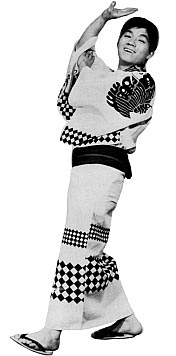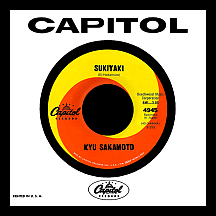KYU SAKAMOTO
Sukiyaki
By 1961, 19-year-old Kyu Sakamoto had already been in show business for several years, having appeared in films and on television while establishing himself as a singer. In that year he recorded "Ue o Muite Aruko," a melodic midtempo ballad with music by Hachidai Nakamura and lyrics by pianist Rokusuke Ei, who sometimes performed with Kyu in nightclubs. The record was a major hit in Japan and later, through a series of random occurrences, made him an international star.
Born Hisashi Sakamoto, his nickname was Kyu, which loosely translates as "Nine" (he had eight older brothers and sisters). Growing up just south of Tokyo in Kawasaki, he began singing as an adolscent and at age 13 landed a small role in the 1955 film Takekurabe. In 1958 he joined Danny Iida and Paradise King, enjoying a popular run the next couple of years with a series of American-inspired rock and roll songs. Going solo with Toshiba Records in 1960, he had a hit with "G.I. Blues," his voice so much like Elvis Presley's as to fool anyone from the U.S. who heard the song into thinking the King himself had recorded a Japanese-language version. More hits followed as he resumed his acting career, appearing in over a dozen films throughout the decade, though Gulliver's Travels Beyond the Moon, a 1967 animated film featuring his voice work, is likely the only one known in the west among a small circle of Anime fans.
Sakamoto was already a major star by the time "Ue o Muite Aruko," with its striking xylophone intro, came out in the fall of 1961, a long-running number one hit on Japan's Music Life charts and the year's best-selling single. Louis Benjamin of Great Britain's Pye Records, on a visit to Japan the following year, heard the song and felt it had enormous potential (an understatement, as it turns out). Kenny Ball and his Jazzmen, who'd already had a major hit with "Midnight in Moscow," recorded an instrumental version that Benjamin retitled "Sukiyaki," reasoning that the original title would be too hard for disc jockeys to pronounce; besides, there were no lyrics, so it seemed logical from a marketing standpoint to give it an easy-to-remember, if wildly innacurate, identity. Ball's single release hit the U.K. top ten in February 1963.
Shortly afterwards, Kapp Records released Ball's single in the U.S., then Billy Vaughn put out his own instrumental version on Dot. Capitol Records leased the master of Sakamoto's original from Toshiba, using the already-established "Sukiyaki" as the title. It was a hard sell at first until Richard Osborne, a disc jockey at KORD in Eastern Washington's Tri-Cities, played the song on his radio show, creating local demand with listeners unphased by the undecipherable lyrics. The buzz spread from there and the record hit the national charts in May, reaching the number one spot the following month (in 1958, Domenico Modugno's "Nel Blu Dipinto Di Blu," sung in Italian, had been the only previous foreign language record to top the American charts). The record broke in many other countries, becoming an international phenomenon. Sakamoto, suddenly feeling demand from all points global, embarked on a tour of the world that summer and fall; in August he visited America and performed his hit on The Steve Allen Show. "Sukiyaki" was a million seller in the U.S., selling well in excess of ten million records around the world. When asked his opinion of the odd food-related title, Kyu replied, "At least 'Sukiyaki' is a Japanese word!"

Once the record had topped the charts, country singer Clyde Beavers set out to record an English-language version. J.S. Shima, an official from the Japanese Embassy in Washington, D.C., provided him with a translation. "Sukiyaki (I Look Up When I Walk)" was the title of his release on the Tempwood V label and it hit the country charts in August, but the lyrics were slightly different: 'I walk with my face up, holding my head up high...so the tears won't fall from my eyes...' A different translation, "My First Lonely Night (Sukiyaki)" by soul singer Jewel Akens, came out in in 1966 but failed to chart. The song's lyricist, Rokusuke Ei, was unhappy with the English translations as well as what seemed to him a very strange title. Imagine you had written a romantic song and it was released as "Goulash"...would you complain? Maybe at first, but once it became a worldwide multi-million seller, you would surely shrug your shoulders, cash your six-figure checks, and live happily ever after! Ei and Nakamura ultimately consoled themselves with the mounds of yen piling up in their bank accounts.
Capitol made a bid for Kyu's extended success in the States with the follow-up single, "China Nights," its title an accurate translation of "Shina No Yoru." A standard in Japan, written by Yaso Saijo and Nobuyuki Takeoka, the ballad about a Japanese man's love for a Chinese woman was first made popular in 1939 by singer and stage actress Watanabe Hamako. Sakamoto's recording featured about 40 seconds of additional English lyrics by Sil Sedores and had a respectable chart run in America in the late summer of '63, sparing him the dreaded "one-hit" tag in this part of the world (while he became one of the all-time most successful singers in his homeland). Capitol released two other singles by Kyu in '63 and '64: "Tankobushi" (a big band tune rhythmically reminiscent of Ary Barroso's "Brazil," made famous by Xavier Cugat in 1943) and "Sayonara Tokyo," his last release until Capitol sister label EMI took another shot in 1975 with "Elimo" (sung in English with a country arrangement!), a failed attempt at reviving his career in North America.
When it comes to the impact Japanese musicians have made in the U.S. and most other countries, Sakamoto is by far the most successful. Elektra Records made an attempt with disco duo Pink Lady in 1979, resulting in the top 40 hit "Kiss in the Dark" (which led to the notorious, short-lived NBC-TV variety series Pink Lady and Jeff in early 1980). Electronic instrumental band Yellow Magic Orchestra had a brief chart run at about the same time with "Computer Games" and Seiko, a superstar singer in Japan during the '80s, made her one and only appearance on the American charts in 1990 with "The Right Combination," featuring Donnie Wahlberg of New Kids on the Block.
The story of Kyu Sakamoto, unfortunately, has a tragic ending. In August 1985 he was aboard Japan Airlines flight 123, which became one of the most devastating air disasters in history. 505 passengers and all 15 crew members died when the plane crashed (amazingly, four passengers survived). He has since come to be regarded as one of the most beloved of all Japanese singers. His death at age 43 was mourned the world over because, after all, who doesn't love "Sukiyaki"? The song, as it turns out, possesses impressive staying power. Many remakes have appeared over the years, some with even different lyrics than earlier versions; of these, recordings by A Taste of Honey (in 1981) and 4 P.M. (in 1994) hit the top ten, giving the song a triple-smash distinction few musical creations have achieved.


